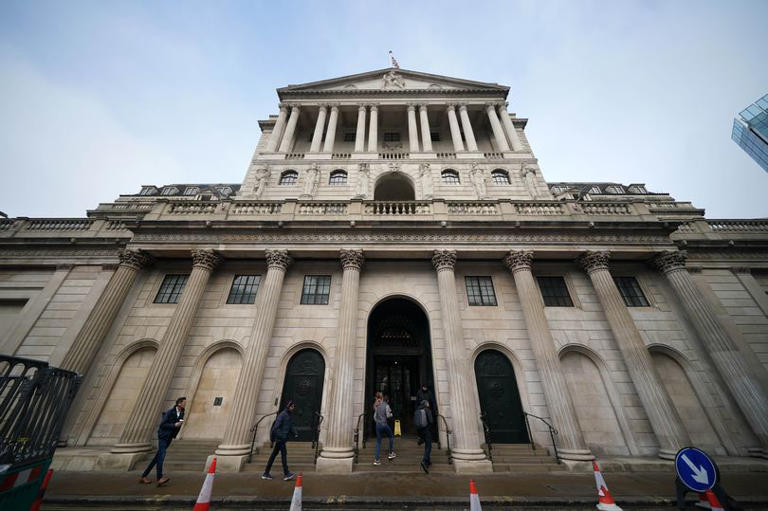“Bank of England Interest Rate Cuts: 5 Powerful Reasons to Stay Ahead of the Curve!”
Table of Contents
ToggleBank of England Interest Rate Cuts: What You Need to Know
Learn about the potential interest rate cuts by the Bank of England and how they could impact the economy. Stay informed about the latest developments in monetary policy.

Bank of England Interest Rate Cuts: A Closer Look
The Bank of England (BoE) has been contemplating interest rate cuts as a measure to stimulate economic growth. Let’s delve into what this means and how it might affect various aspects of the economy.
Current Economic Climate: Signs of Slowdown
Recent data indicates a slowdown in new starter salary growth and a decline in permanent UK staff appointments. This suggests that economic conditions may be uncertain, with businesses possibly facing budget constraints.
BoE’s Stance: Holding Pattern or Rate Cut?
During its most recent Monetary Policy Committee (MPC) meeting in March, the BoE decided to maintain interest rates at 5.25%. This marks the fifth consecutive pause in rate hikes after a series of increases. Interestingly, one MPC member voted in favor of a rate cut during this meeting.
Market Expectations: Anticipating Rate Reductions
Market analysts foresee the possibility of a rate cut as early as the upcoming June meeting. The consensus expectation is for a 25 basis point cut, with additional cuts totaling 50 basis points by the end of the year.
Inflation Insights: Peaking and Trending Down
Inflation reached its peak at 11.1% in October 2022 but has gradually declined to 3.4% as of February. The BoE is closely monitoring inflation trends to gauge ongoing price pressures in the economy.
Potential Timing: June or Later?
While June seems to be a likely candidate for a rate cut, this decision could be pushed back to August or beyond, depending on incoming inflation data. Analysts caution that if inflation remains higher than expected, the BoE might delay rate cuts to ensure a balanced approach to managing inflation while supporting economic growth.
Implications for the Economy: What to Expect
If the BoE proceeds with interest rate cuts, several implications for the economy could arise:
- Stimulating Borrowing and Spending: Lower interest rates typically encourage borrowing and spending, which can help stimulate economic activity and investment.
- Support for Businesses: Reduced borrowing costs can provide relief to businesses facing financial constraints, potentially encouraging expansion and hiring.
- Impact on Savings and Investments: Lower interest rates may lead to reduced returns on savings accounts and fixed-income investments, prompting individuals to seek alternative investment opportunities.
- Currency Market Movements: Interest rate cuts can influence currency market dynamics, potentially leading to fluctuations in exchange rates.
- Inflation Management: While interest rate cuts can support economic growth, they also carry the risk of exacerbating inflationary pressures if not carefully managed by the central bank.
Looking Ahead: What the Future Holds
As the BoE continues to assess economic indicators and inflation trends, it remains committed to making data-driven decisions regarding monetary policy. Whether interest rate cuts materialize in the near term or are delayed, the central bank aims to strike a balance between supporting economic recovery and maintaining price stability.
Conclusion: Stay Informed and Prepared
In conclusion, the potential for interest rate cuts by the Bank of England underscores the importance of staying informed about developments in monetary policy. Whether you’re a business owner, investor, or consumer, understanding the implications of these decisions can help you make informed financial choices in an ever-changing economic landscape. Keep an eye on upcoming MPC meetings and inflation reports for insights into the BoE’s future actions and their potential impact on the economy.
Bank of England Interest Rate Cuts: Key Takeaways
- The BoE is considering interest rate cuts to stimulate economic growth.
- Recent economic data suggests signs of a slowdown, prompting discussions about potential rate reductions.
- Market analysts anticipate rate cuts starting as early as the June meeting, but timing may depend on incoming inflation data.
- Lower interest rates could have implications for borrowing, spending, savings, investments, and currency markets.
- Staying informed about monetary policy developments can help individuals and businesses make sound financial decisions in a changing economic environment.
ALSO READ:
“Didcot’s Parking Chaos: The £70 Permit Shock!”



